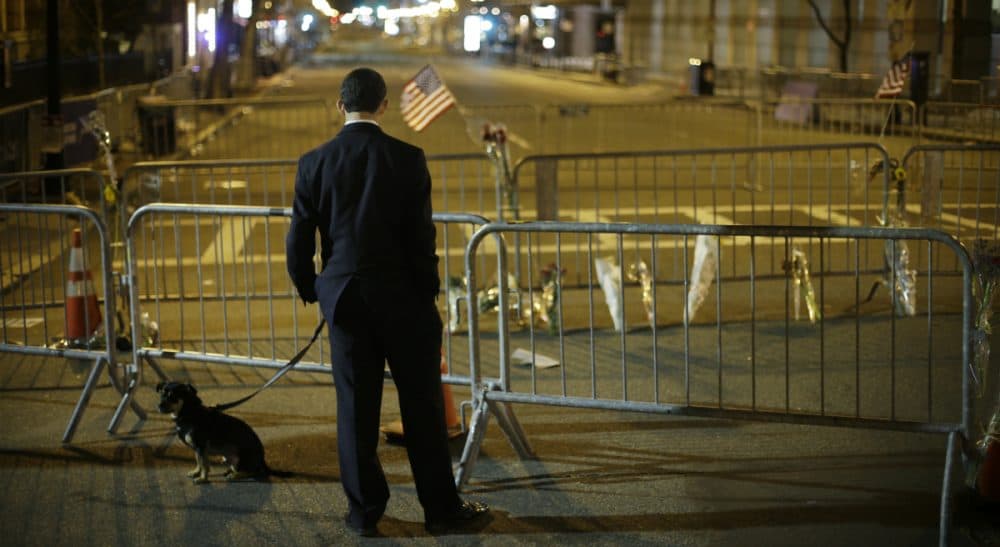Advertisement
What It Really Means To Be Safe In A Democracy

The American people have been fed five reports in recent days analyzing the events leading up to and following the Boston Marathon bombing.
The House Homeland Security report and an Inspector General’s assessment both purport to highlight failures that led to the bombing. A Harvard University report looks at the police response in the immediate aftermath of the attacks. A Department of Justice report and local Florida prosecutor’s report examine the FBI and Massachusetts State Police role in the shooting death of a man, Ibragim Todashev, who was closely connected to and reportedly had information about alleged bomber Tamerlan Tsarnaev.
Ironically, these reports raise more questions than they answer about the role of the FBI, the State Police and local cops in the events surrounding the Marathon bombings, as well as an apparently related triple homicide that took place on the 10th anniversary of 9/11 in Waltham, Massachusetts.
None of the reports answer — or even ask — critical questions about what the FBI was doing instead of investigating Tsarnaev in 2011 and 2012. The Boston FBI has publicly said that it conducted more than 1,000 “assessments” on people in 2011 alone.
Who were they watching if not Tsarnaev? We know that in 2011, the Boston Police and State Police were surveilling Occupy Boston and feeding information about them to the FBI. Who else were they surveilling? Peace and environmental activists? Tea Party activists?
None of the reports ask why law enforcement failed to question the elder Tsarnaev during the investigation of the 2011 triple murder. None explain how prosecutors suddenly discovered forensic evidence reportedly linking Tsarnaev to the murders in the days immediately following the 2013 Marathon bombing, or why that evidence wasn’t available prior to the Marathon attacks.
The lessons are clear: we should reinvest in traditional policing and effective homicide investigations. We should train our law enforcement officers to investigate crimes, rather than investigate innocent people.
Nor do the reports raise basic questions regarding lines of authority and accountability between the FBI and Massachusetts state and local police under the auspices of the “Joint Terrorism Task Force.” This latest question is the subject of an ACLU of Massachusetts Freedom of Information Act request and lawsuit, which the ACLU filed in federal court on April 10.
Rather than ask the hard questions, it seems the government and media want to lay blame for the marathon bombings on the Russians -- who once again are becoming the enemy du jour — while the FBI presses for expanded powers to wiretap ordinary people without a criminal predicate.
Instead, the American people should use the anniversary of the Boston Marathon bombing to reflect on what it really means to be safe in a democracy.
Since 9/11, federal agencies and state and local law enforcement have been given hundreds of billions of dollars and breathtaking power to investigate anyone they deem “suspicious.” Massive databases containing personal and sensitive information have been constructed at a new CIA-run National Counterterrorism Center, while the National Security Agency has invoked its power and prowess to track your every move and mouse-click. The Department of Homeland Security was created and has funded the local-level expansion of a surveillance state though “data fusion” centers — including two in Massachusetts.
Advertisement
None of these efforts stopped the Boston Marathon bombings.
If we are to believe the FBI, solving a 2011 triple murder in Waltham may have, by itself, prevented the Boston Marathon bombings.
The lessons are clear: we should reinvest in traditional policing and effective homicide investigations. We should train our law enforcement officers to investigate crimes, rather than investigate innocent people.
Allowing officers to spy on people who have no link to criminal activity enables political surveillance, like the kind the ACLU uncovered in 2011 and reported in Policing Dissent.
Traditional gumshoe police work may not be as sexy and exciting as deploying new toys to spy on ordinary Americans. But it would do a lot more to keep us safe — and free.
Related:
